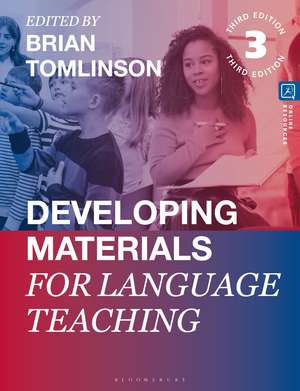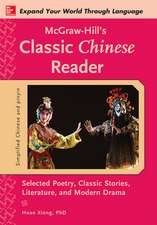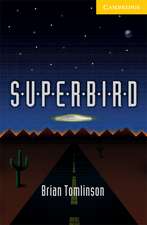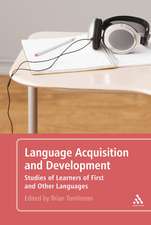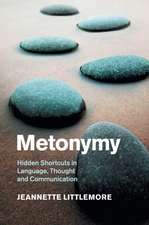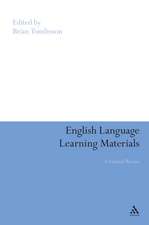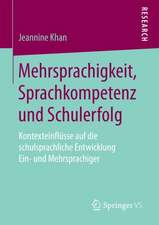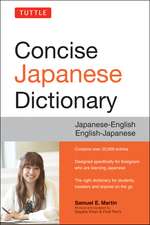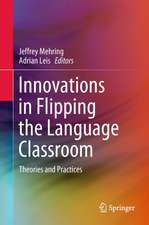Developing Materials for Language Teaching
Editat de Brian Tomlinsonen Limba Engleză Hardback – 23 aug 2023
| Toate formatele și edițiile | Preț | Express |
|---|---|---|
| Paperback (2) | 233.72 lei 3-5 săpt. | +63.19 lei 4-10 zile |
| Bloomsbury Publishing – 23 aug 2023 | 233.72 lei 3-5 săpt. | +63.19 lei 4-10 zile |
| Bloomsbury Publishing – 18 dec 2013 | 312.46 lei 6-8 săpt. | |
| Hardback (2) | 618.17 lei 6-8 săpt. | +147.69 lei 4-10 zile |
| Bloomsbury Publishing – 23 aug 2023 | 618.17 lei 6-8 săpt. | +147.69 lei 4-10 zile |
| Bloomsbury Publishing – 18 dec 2013 | 1077.89 lei 6-8 săpt. |
Preț: 618.17 lei
Preț vechi: 823.06 lei
-25% Nou
Puncte Express: 927
Preț estimativ în valută:
118.32€ • 128.57$ • 99.46£
118.32€ • 128.57$ • 99.46£
Carte tipărită la comandă
Livrare economică 21 aprilie-05 mai
Livrare express 14-20 martie pentru 157.68 lei
Preluare comenzi: 021 569.72.76
Specificații
ISBN-13: 9781350199682
ISBN-10: 1350199680
Pagini: 584
Ilustrații: 64 bw illus.
Dimensiuni: 189 x 246 x 25 mm
Greutate: 1.62 kg
Ediția:3
Editura: Bloomsbury Publishing
Colecția Bloomsbury Academic
Locul publicării:London, United Kingdom
ISBN-10: 1350199680
Pagini: 584
Ilustrații: 64 bw illus.
Dimensiuni: 189 x 246 x 25 mm
Greutate: 1.62 kg
Ediția:3
Editura: Bloomsbury Publishing
Colecția Bloomsbury Academic
Locul publicării:London, United Kingdom
Caracteristici
Existing chapters have been fully revised and updated, with fresh examples and greater coverage of teaching second languages other than English
Notă biografică
Brian Tomlinson is Professor of TESOL at Anaheim University, USA and Honorary Visiting Professor at the University of Liverpool, UK. He has worked in Japan, Indonesia, Nigeria, Oman, Singapore, the UK, Vanuatu and Zambia, and is Founder and President of the Materials Development Association (MATSDA).
Cuprins
List of FiguresList of TablesList of ContributorsPreface, Brian Tomlinson (Anaheim University, USA)Introduction: Are Materials Developing? Brian Tomlinson (Anaheim University, USA)Part I: Evaluation and Adaptation of Materials1. Materials Evaluation, Brian Tomlinson (Anaheim University, USA)2. Adapting Courses: A Personal View, Claudia Saraceni (University of Bedfordshire, UK)3. How Are Materials Actually Used? Claudia Fernandez (University of Illinois Chicago, USA)Comments on Part I, Brian Tomlinson (Anaheim University, USA)Part II: Principles and Procedures of Materials Development4. Using Text-Driven and Other Principled Frameworks for Developing Materials for Language Learning, Brian Tomlinson (Anaheim University, USA)5. Humanizing the Coursebook, Brian Tomlinson (Anaheim University, USA)6. Reading Software Is As It Is Because Of What It Has To Do - A Systemic Functional Approach to Developing and Evaluating Digital Materials, Duriya Aziz Singapore Wala (Scholastic, Singapore)7. The Visual Elements in EFL Coursebooks, David A. Hill and Nicolas Hurst (University of Porto, Portugal)8. Creative Approaches to Writing Materials, Alan Maley (Assumption University, Bangkok, Thailand)9. Developing Digital Language Learning Materials, Thom Kiddle and Chris Farrell (NILE ELT, UK)10. Materials for Blended Learning, Pete Sharma (Pete Sharma Associates Ltd, UK)11. Mobile Assisted Language Learning (MALL), Nicky Hockly (The Consultants-E, Spain)Comments on Part II, Brian Tomlinson (Anaheim University, USA)Part III: Developing Materials for Target Groups12. Language Teaching Materials for Young and Very Young Learners: Developmental Framework, Irma Ghosn (Lebanese American University, Lebanon)13. Helping Young Learners to Read in an L2, Shelagh Rixon (University of Warwick, UK)14. Materials for Adults: 'I am No Good at Languages!' - Inspiring and Motivating L2 Adult Learners of Beginner's Spanish, Rosa-Maria Cives-Enriquez (Chartered Institute of Linguists, UK)15. Mining the L2 Environment: ESOL Learners and Strategies Outside the Classroom, Naeema Haan (Leeds Beckett University, UK)16. Materials for Teaching Right to Left Languages Naeema Haan (Leeds Beckett University, UK)Comments on Part III, Brian Tomlinson (Anaheim University, USA)Part IV: Developing Specific Types of Materials17. 'The structure comes first': How Coursebooks Commodify Grammar, Scott Thornbury (Freelance Consultant)18. Materials for Teaching Vocabulary, Paul Nation (Victoria University of Wellington, New Zealand)19. Materials for Developing Reading Skills, Hitomi Masuhara (University of Liverpool, UK)20. Materials for Developing Writing Skills, Ken Hyland (University of East Anglia, UK)21. Developing Materials for Speaking Skills, Dat Bao (Monash University, Australia)22. Coursebook Listening Activities, David A. Hill and Brian Tomlinson (Anaheim University, USA)23. Materials for Developing Competence in Multi-Modal Discourse, Kay O'Halloran (University of Liverpool, UK)24. Towards Intercultural Competence: Materials for Raising Intercultural Awareness, Freda Mishan (University of Limerick, Ireland)25. Corpora and Materials: Towards a Working Relationship, Ivor Timmis (Leeds Beckett University, UK)26. Materials for Developing Communicative Competence, Brian Tomlinson (Anaheim University, USA)Comments on Part IV, Brian Tomlinson (Anaheim University, USA)Conclusion, Brian Tomlinson (Anaheim University, USA)Index
Recenzii
Because of its stress on practical applications of theory and research . . . [this book] will be of great value to materials writers, publishers, and teachers interested in designing their own materials. A welcome contribution to the field.
Offers new insights into a wealth of topics, issues and perspectives that represent the current state of materials development thereby increasing teachers' awareness of changes in practice.
Developing Materials for Language Teaching (3rd Ed.) is a completely updated reference resource and course book for materials designers and language teachers at all levels of professional development. Its strength is in its comprehensiveness, not only of content and key issues but also in geographic and education context coverage.
This valuable resource brings together well-established and new voices in the field of materials development to create a varied and up-to-date collection of chapters. Tomlinson's volumes are known for their challenging and hard-hitting examination of the status quo, and this book does not disappoint. New chapters offer much-needed insights into under-researched areas such as the use of materials, right to left scripted languages and the commodification of grammar, and 'old' chapters have been updated with fresh insights. An essential for anyone researching, studying or practising materials development.
Offers new insights into a wealth of topics, issues and perspectives that represent the current state of materials development thereby increasing teachers' awareness of changes in practice.
Developing Materials for Language Teaching (3rd Ed.) is a completely updated reference resource and course book for materials designers and language teachers at all levels of professional development. Its strength is in its comprehensiveness, not only of content and key issues but also in geographic and education context coverage.
This valuable resource brings together well-established and new voices in the field of materials development to create a varied and up-to-date collection of chapters. Tomlinson's volumes are known for their challenging and hard-hitting examination of the status quo, and this book does not disappoint. New chapters offer much-needed insights into under-researched areas such as the use of materials, right to left scripted languages and the commodification of grammar, and 'old' chapters have been updated with fresh insights. An essential for anyone researching, studying or practising materials development.
